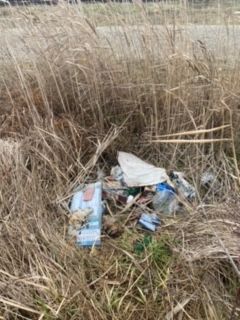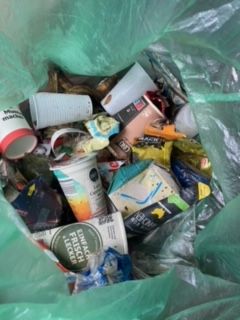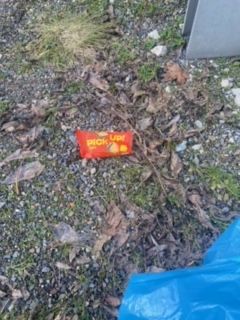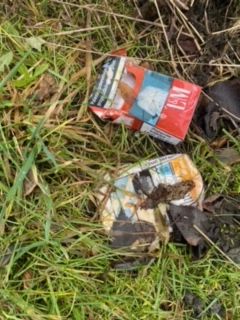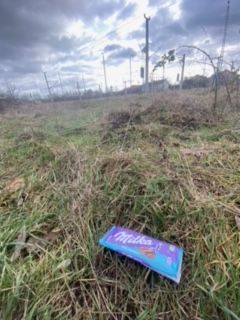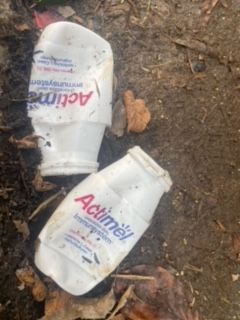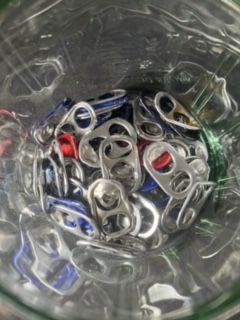Jenny Soggia (talk | contribs) No edit summary |
|||
| (88 intermediate revisions by 2 users not shown) | |||
| Line 1: | Line 1: | ||
=== | ==Ist das Kunst oder kann das schon weg?== | ||
This artwork shows how a simple human behaviour, of picking up trash can create a collection. As a collection it looses the term of "trash" and regains new purpose, by displaying it in a pathological way. | |||
Thoughts about the past from these objects occur, like where did these come from and why did the previous owner not think about putting it into the actual place it´s supposed to be in: a bin. | |||
This collection also improves the environment in the present, giving it a sustainable sense while making it aesthetically pleasing. For future relevances it´s important to have an overview of what humans leave behind. Making it an overall time factor. | |||
[[File:TrashPathologyVideo.mov|600px]] | |||
'''This video shows the most found collectables:''' Tissue packages, Corona masks, Cigarette boxes, Glas sheds, Banana peels, Candy wrappers, Can openers | |||
'''Past: memories''' | |||
What is seen as trash by people who throw them on the ground, rather than putting it into a bin, a collectors mind sees treasure. | |||
Purposeless objects regain a new purpose: | |||
Questions about the object create hidden stories of the person who has touched it last. | |||
In the past. | |||
== | Reflect, collect. Collect, reflect. | ||
[[ | |||
This artwork is a collection of imagined memories to create new memories. | |||
'''Present: act of doing''' | |||
By simply picking up trash the environment gets cleared up. | |||
Two present moments can happen: | |||
People who walk past trash feel a dirty surrounding // People who walk in surroundings of no sights of trash feel how it´s sopposed to be. | |||
Clear space = clear mind. | |||
No need to step over past purposeless objects of the unknown people. | |||
People are able to breathe. People sense nature. People can have a break from noticing world issues of pollution. People love to notice. | |||
A performance with art: | |||
Pure act of doing. | |||
'''Future: relevance''' | |||
Collected objects contain a new purpose: Awareness, insights, rethinking of own behaviours and most importantly: Art. | |||
Collected objects in display. | |||
'''Before / After''' | |||
[[File:TrashBefore.jpeg]] [[File:TrashAfter.jpeg]] | |||
'''The Beauty of Trash''' | |||
[[File:Trashbag.jpeg]] [[File:PickUp.jpeg]] [[File:Tobaco.jpeg]] [[File:Trashmilka.jpeg]] [[File:actimel.jpeg]] | |||
'''Learn Factor''' | |||
Through letting go of embarrassment carrying a trash bag around, a higher form of acceptance has been achieved. Even better, people around are thankfull and compliment this work of art. In hope to inspire them to try out such act of kindness themselves or even just reflect on behaviours to change for a greater good brings new teachings on all kinds of levels. By making it fun to do, rather than feeling angry at humanity, it brings ease to the mind. Cleaning up within and on the outside. | |||
==Process== | |||
*[[/The process of making a sustainable and aesthetic project]] | |||
[[File:canopeners1.jpeg|400px]] | |||
==On Sustainable Aesthetics== | |||
Subjectively speaking, the words have two different meanings, which can collide into one understanding. | |||
*Sustainability can be seen as taking eco-friendly ressources and giving it life and therefore great purposes. For example recycling/ upcycling. By using what is already there, we get to make materials or objects more long lasting, without creating new waste. | |||
*The aesthetics is what makes the sustainable into some kind of art form. Giving it new life, new meanings and perspectives. Since aesthetic is subjective, the creator has freedom in its expressions and can chose how the art work is presented. Making it a sustainable aesthetic. | |||
==Experiments== | |||
*[[Documentation of microbial fuel cell]] | |||
*[[Building a Joule Thief]] | |||
==References== | ==References== | ||
| Line 53: | Line 83: | ||
*Living Alone for 2 Years in a Biosphere, https://www.youtube.com/watch?v=oaSRIR9AjFU | *Living Alone for 2 Years in a Biosphere, https://www.youtube.com/watch?v=oaSRIR9AjFU | ||
*How to build a terrarium, Beginners Guide: *https://www.youtube.com/watch?v=t2jL3QP4hTA&t=329s | *How to build a terrarium, Beginners Guide: *https://www.youtube.com/watch?v=t2jL3QP4hTA&t=329s | ||
* | *Plastic art: [https://www.boredpanda.com/plastic-bottle-sculpture-recycle-art-veronika-richterova/?utm_source=google&utm_medium=organic&utm_campaign=organic] | ||
[https://hotelelephant.co.uk/blog/2022/2/4/how-some-artists-have-turned-plastic-waste-into-impactful-works-of-art] | [https://hotelelephant.co.uk/blog/2022/2/4/how-some-artists-have-turned-plastic-waste-into-impactful-works-of-art] | ||
[https://ecoartdatabase.org/en/showcase/] | [https://ecoartdatabase.org/en/showcase/] | ||
Latest revision as of 16:42, 6 February 2023
Ist das Kunst oder kann das schon weg?
This artwork shows how a simple human behaviour, of picking up trash can create a collection. As a collection it looses the term of "trash" and regains new purpose, by displaying it in a pathological way. Thoughts about the past from these objects occur, like where did these come from and why did the previous owner not think about putting it into the actual place it´s supposed to be in: a bin.
This collection also improves the environment in the present, giving it a sustainable sense while making it aesthetically pleasing. For future relevances it´s important to have an overview of what humans leave behind. Making it an overall time factor.
This video shows the most found collectables: Tissue packages, Corona masks, Cigarette boxes, Glas sheds, Banana peels, Candy wrappers, Can openers
Past: memories
What is seen as trash by people who throw them on the ground, rather than putting it into a bin, a collectors mind sees treasure.
Purposeless objects regain a new purpose: Questions about the object create hidden stories of the person who has touched it last. In the past.
Reflect, collect. Collect, reflect.
This artwork is a collection of imagined memories to create new memories.
Present: act of doing
By simply picking up trash the environment gets cleared up.
Two present moments can happen: People who walk past trash feel a dirty surrounding // People who walk in surroundings of no sights of trash feel how it´s sopposed to be.
Clear space = clear mind.
No need to step over past purposeless objects of the unknown people. People are able to breathe. People sense nature. People can have a break from noticing world issues of pollution. People love to notice.
A performance with art: Pure act of doing.
Future: relevance
Collected objects contain a new purpose: Awareness, insights, rethinking of own behaviours and most importantly: Art.
Collected objects in display.
Before / After
The Beauty of Trash
Learn Factor
Through letting go of embarrassment carrying a trash bag around, a higher form of acceptance has been achieved. Even better, people around are thankfull and compliment this work of art. In hope to inspire them to try out such act of kindness themselves or even just reflect on behaviours to change for a greater good brings new teachings on all kinds of levels. By making it fun to do, rather than feeling angry at humanity, it brings ease to the mind. Cleaning up within and on the outside.
Process
On Sustainable Aesthetics
Subjectively speaking, the words have two different meanings, which can collide into one understanding.
- Sustainability can be seen as taking eco-friendly ressources and giving it life and therefore great purposes. For example recycling/ upcycling. By using what is already there, we get to make materials or objects more long lasting, without creating new waste.
- The aesthetics is what makes the sustainable into some kind of art form. Giving it new life, new meanings and perspectives. Since aesthetic is subjective, the creator has freedom in its expressions and can chose how the art work is presented. Making it a sustainable aesthetic.
Experiments
References
- The Martian Garden, https://www.themartiangarden.com
- NASA https://www.nasa.gov/mission_pages/station/research/news/meals_ready_to_eat/
- Hito Steyerl - Ausstellung, https://www.museum-joanneum.at/kunsthaus-graz/ausstellungen/ausstellungen/events/event/10951/hito-steyerl
- In Kepler's Gardens, https://ars.electronica.art/keplersgardens/en/the-biosphere-project/
- Klaus Herbst, Pflanzfabrik, https://www.instagram.com/pflanzfabrik/?hl=en
- Living Alone for 2 Years in a Biosphere, https://www.youtube.com/watch?v=oaSRIR9AjFU
- How to build a terrarium, Beginners Guide: *https://www.youtube.com/watch?v=t2jL3QP4hTA&t=329s
- Plastic art: [1]
